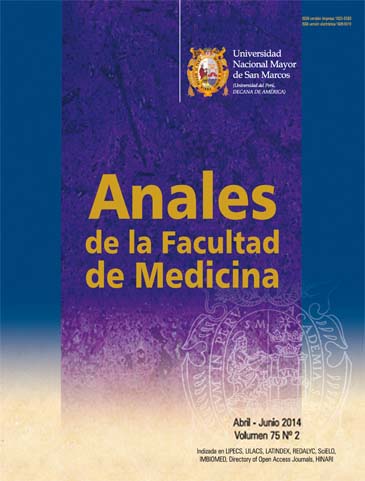Vascular endothelial growth factor (VEGF) gene polymorphism association with preeclampsia
DOI:
https://doi.org/10.15381/anales.v75i2.8383Keywords:
Preeclampsia, VEGF, polymorphism, geneAbstract
Background: Preeclampsia (PE) is the first cause of maternal death in the world and affects about 10% of pregnant women in some Peruvian regions. Various genes are involved en PE risk, including the vascular endothelial gene factor (VEGF). Objetives: To study VEGF gene +936 CT polymorphism and to determine its association with preeclampsia. Design: Observational, relational (associative), case-control (non-experimental) study. Setting: Faculty of Medicine, Universidad Nacional Mayor de San Marcos, Lima, Peru. Participants: Pregnant women with and without preeclampsia. Methods: The sample included 94 pregnant women (45 with PE and 49 controls without PE) attended at Hospital Docente Madre-Niño San Bartolome. Following informed consent, 3-5 mL of blood was collected. DNA was isolated by standard methods. VEGF polymorphism was determined by PCR-RFLP and electrophoresis in either agarose or polyacrylamide gels. Main outcome measures: Association between VEGF genotypes and alleles with preeclampsia. Results: CC, CT y TT genotypes distribution in the Cases group were in ‘Hardy-Weinberg imbalance’ (there was a factor influencing that distribution), while genotypes in the Control group were in equilibrium. Cases and controls VEGF genotypes frequencies showed non-significant differences within significance limits (X2=5.630, p=0.060). TT homocygote was the most frequent genotype present in cases and CT heterocygote genotypes the most frequents in controls. C and T alleles frequency differences in cases and controls were non-significant (X2=0.614, p=0.434). Conclusions: There was no association between VEGF genotypes (but in significance limit) and alleles with preeclampsia in the sample studied, but results have to be confirmed and other Peruvian samples have to be studied for confirmation.Downloads
Published
2014-06-16
Issue
Section
Trabajos originales
License
Copyright (c) 2014 José Pacheco Romero, Doris Huerta, Oscar Acosta, Santiago Cabrera, Marlene Vargas

This work is licensed under a Creative Commons Attribution-NonCommercial-ShareAlike 4.0 International License.
Those authors who have publications with this magazine accept the following terms:
- Authors will retain their copyrights and guarantee the journal the right of first publication of their work, which will be simultaneously subject to Creative Commons Attribution License that allows third parties to share the work as long as its author and its first publication this magazine are indicated.
- Authors may adopt other non-exclusive licensing agreements for the distribution of the version of the published work (eg, deposit it in an institutional electronic file or publish it in a monographic volume) provided that the initial publication in this magazine is indicated.
- Authors are allowed and recommended to disseminate their work over the Internet (eg: in institutional telematic archives or on their website) before and during the submission process, which It can produce interesting exchanges and increase quotes from the published work. (See El efecto del acceso abierto ).
How to Cite
1.
Pacheco Romero J, Huerta D, Acosta O, Cabrera S, Vargas M. Vascular endothelial growth factor (VEGF) gene polymorphism association with preeclampsia. An Fac med [Internet]. 2014 Jun. 16 [cited 2025 Jun. 5];75(2):119-23. Available from: https://revistasinvestigacion.unmsm.edu.pe/index.php/anales/article/view/8383



